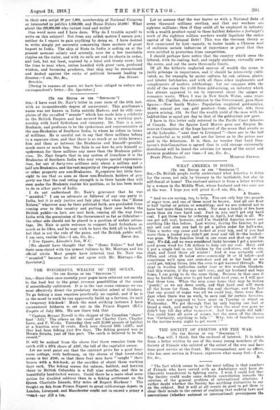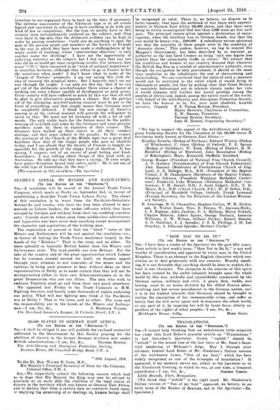THE SOCIETY OF FRIENDS AND THE WAR. [To THE EDITOR
OF THE " SPECTATOR."] SIE,—You will, I think, find the enclosed of interest. It is taken from a letter written by one of the many young members of the Society of Friends who enlisted at the outset of the war and have done good service at the front. My correspondent, now an officer, who has seen service in France, expresses what many feel.—I am,
"The fact which seems to me the most telling is that numbers of Friends who have served with an Ambulance unit have de- liberately transferred to fighting units. I wish I could feel thar the Society could make some definite contribution towards the solution of the general problem of international relations. I rather doubt whether the Society has anything distinctive to say on the subject. But it will at all events do good to get them to clear their minds to the extent of realizing that making laws and conventions- (whether national or international) presupposes the intention to use:orggnized force to back up the laws,. if necessary. The extreme non-resister of the Tolstoyan type is at all events logical and consistent in refusing to have anything to do with any kind of law or compulsion. But the type we mostly have in this country seem extraordinarily confused on the subject, and cling very hard to the idea that the deliberate evildoer can be kept in order by passing resolutions. Could you do anything to open the eyes of the genuine people and members of the Society of Friends to the way in which they have been made a stalking-horse of by whole crowds of humbugs, whose `conscientious objection' is only another name for shirking? I have not the opportunity of collecting statistics on the subject, but I feel sure that any one who did do so would get some surprising results. For instance, how many "C.O.'s ' have consented to do work of national importance' in munition factories, although they refuse to go to France to fire the munitions when made? I don't know what to make of the 'League of Nations' proposals. I am not saying this with the idea of running the proposal down. - But I honestly don't see my way through the tangle. I can only see this far, that if we can get rid of the deliberate mischief-maker there seems a chance of working out some scheme capable of development as need arises. Every country will have suffered so much by this war that all will he glad to give alternative proposals a chance. But the getting rid of the intriguing, mischief-making element must be put in the front of everything, and that simply means that Germany must be completely defeated. I think the new energy of Ameri-a coining in at the critical moment will provide the will-power to insist on this. We must not let Germany off with a lot of soft words. The only stable basis for the future must be the public wearing of sackcloth and ashes by the Germans and some genuine sacrifices made by them in expiation of their crimes. The Germans have backed up their rulers in all their crooked dealings, and they must submit to the penalty. In this respect the sentiment of the Church of the Middle Ages was a great deal healthier than that of the sloppy people who pose as idealists to-day. and I am afraid that the Society of Friends is largely re- sponsible for the growth of the sloppy kind of idealism. It has sprung, I suppose, out of an excess of good feeling and kind- heartedness. I was talking about things of this kind with an Australian. He told me that they have a saying, 'If your neigh- bour quotes Scripture, brand your calves early.' He is not one of the wild type of Australian, by the way."
[We comment on this elsewhere.—En. Spectator.]



























 Previous page
Previous page